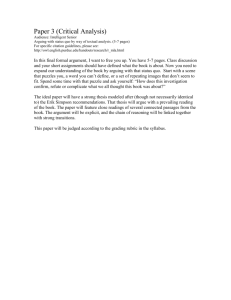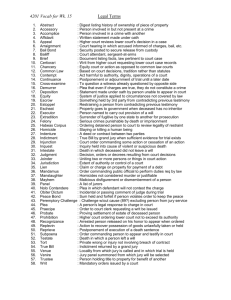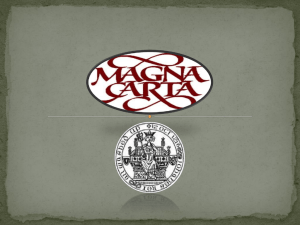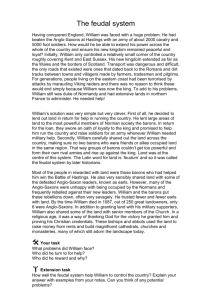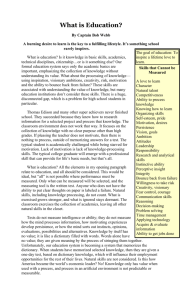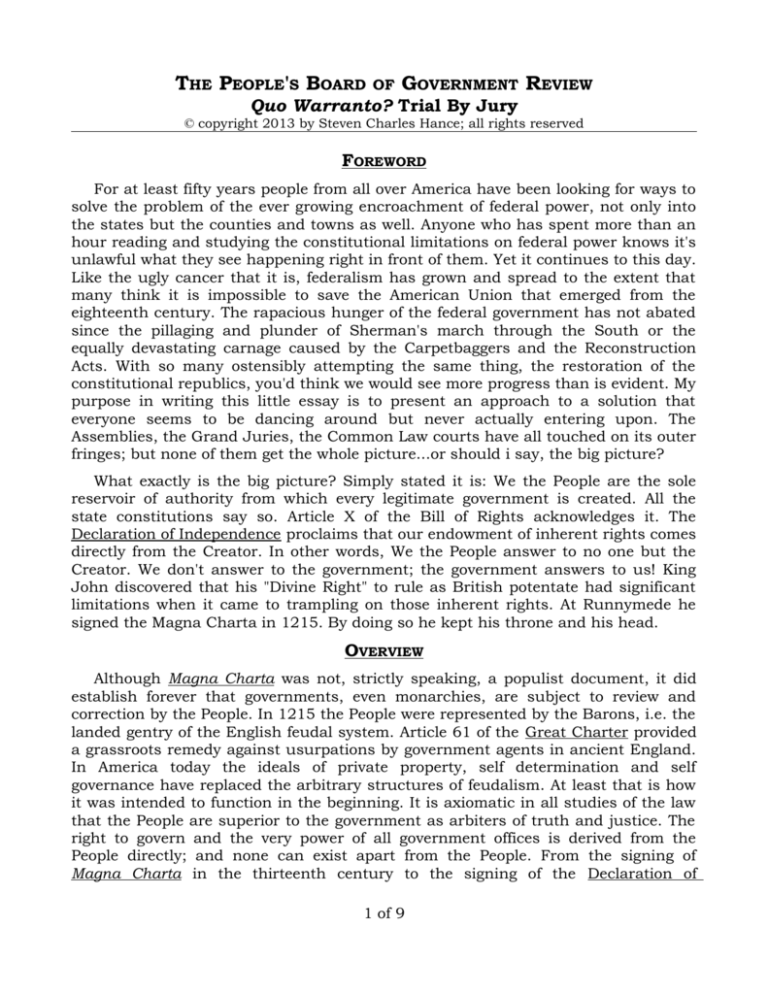
THE PEOPLE'S BOARD
OF
GOVERNMENT REVIEW
Quo Warranto? Trial By Jury
© copyright 2013 by Steven Charles Hance; all rights reserved
FOREWORD
For at least fifty years people from all over America have been looking for ways to
solve the problem of the ever growing encroachment of federal power, not only into
the states but the counties and towns as well. Anyone who has spent more than an
hour reading and studying the constitutional limitations on federal power knows it's
unlawful what they see happening right in front of them. Yet it continues to this day.
Like the ugly cancer that it is, federalism has grown and spread to the extent that
many think it is impossible to save the American Union that emerged from the
eighteenth century. The rapacious hunger of the federal government has not abated
since the pillaging and plunder of Sherman's march through the South or the
equally devastating carnage caused by the Carpetbaggers and the Reconstruction
Acts. With so many ostensibly attempting the same thing, the restoration of the
constitutional republics, you'd think we would see more progress than is evident. My
purpose in writing this little essay is to present an approach to a solution that
everyone seems to be dancing around but never actually entering upon. The
Assemblies, the Grand Juries, the Common Law courts have all touched on its outer
fringes; but none of them get the whole picture...or should i say, the big picture?
What exactly is the big picture? Simply stated it is: We the People are the sole
reservoir of authority from which every legitimate government is created. All the
state constitutions say so. Article X of the Bill of Rights acknowledges it. The
Declaration of Independence proclaims that our endowment of inherent rights comes
directly from the Creator. In other words, We the People answer to no one but the
Creator. We don't answer to the government; the government answers to us! King
John discovered that his "Divine Right" to rule as British potentate had significant
limitations when it came to trampling on those inherent rights. At Runnymede he
signed the Magna Charta in 1215. By doing so he kept his throne and his head.
OVERVIEW
Although Magna Charta was not, strictly speaking, a populist document, it did
establish forever that governments, even monarchies, are subject to review and
correction by the People. In 1215 the People were represented by the Barons, i.e. the
landed gentry of the English feudal system. Article 61 of the Great Charter provided
a grassroots remedy against usurpations by government agents in ancient England.
In America today the ideals of private property, self determination and self
governance have replaced the arbitrary structures of feudalism. At least that is how
it was intended to function in the beginning. It is axiomatic in all studies of the law
that the People are superior to the government as arbiters of truth and justice. The
right to govern and the very power of all government offices is derived from the
People directly; and none can exist apart from the People. From the signing of
Magna Charta in the thirteenth century to the signing of the Declaration of
1 of 9
THE PEOPLE'S BOARD
OF
GOVERNMENT REVIEW
Quo Warranto? Trial By Jury
© copyright 2013 by Steven Charles Hance; all rights reserved
Independence five centuries later, history has shown us that once the People have
determined to speak their minds, to express their collective Will, government has no
choice but to yield.
And so it becomes a matter of authority. It is a well established point of law,
especially in these American states, that all authority is vested by the Creator in the
People; and even when that authority has been delegated to various offices of
government, it can be retrieved at will should the People decide it is needful.
Although it is generally agreed that Article 61 of Magna Charta gave rise to the
grand jury concept we know today, in truth it was far more than that. Article 61
provided for any twenty-five Barons to create an investigative body to enquire into
misdeeds alleged to have been done by the king himself or any of his officers; but
that body was not limited in its authority or power to mere investigation as are
grand juries today. It had power to make determinations of both fact and law, which
meant it also functioned as a Trial By Jury. It was also empowered to hand down
judgments and orders, just like any court of law. Furthermore such broad powers
could be utilized by any four of the twenty-five Barons. Those four could initiate an
investigation, hear testimony, examine evidence and rule on the guilt or innocence of
the officer in question, including the king himself. Their decisions were final and
enforceable directly against the king or his officers. Enforcement devolved to all of
the Barons working in concert with the entire population of the country if need be.
Following is quoted the pertinent part of the Article...
"..they shall elect twenty-five barons of the kingdom, whom they will, who
ought with all their power to observe, hold, and cause to be observed, the
peace and liberties which we have conceded to them, and by this our present
charter confirmed to them; in this manner, that if we or our justiciar, or our
bailiffs, or any of our servants shall have done wrong in any way toward any
one, or shall have transgressed any of the articles of peace or security; and
the wrong shall have been shown to four barons of the aforesaid twenty-five
barons, let those four barons come to us or to our justiciar, if we are out of the
kingdom, laying before us the transgression, and let them ask that we cause
that transgression to be corrected without delay. And if we shall not have
corrected the transgression or, if we shall be out of the kingdom, if our
justiciar shall not have corrected it within a period of forty days, counting
from the time in which it has been shown to us or to our justiciar, if we are
out of the kingdom; the aforesaid four barons shall refer the matter to the
remainder of the twenty-five barons, and let these twenty-five barons with
the whole community of the country distress and injure us in every way they
can; that is to say by the seizure of our castles, lands, possessions, and in
such other ways as they can until it shall have been corrected according to
their judgment, saving our person and that of our queen, and those of our
2 of 9
THE PEOPLE'S BOARD
OF
GOVERNMENT REVIEW
Quo Warranto? Trial By Jury
© copyright 2013 by Steven Charles Hance; all rights reserved
children; and when the correction has been made, let them devote themselves
to us as they did before..."
This describes the essence of self-help for redress against oppression and
usurpations of power. In other words, once a proper proceeding was undertaken
within the framework of a duly formed "Article 61 Committee for Redress", any
action taken by the Barons and the entire populace, if needed, could not be
construed as insurrection. It could not even be called a breach of the peace! This is
not a difficult concept to adopt for modern day redress of grievances.
QUO WARRANTO EXAMINED
The scope of this small work is too narrow to fully inspect all historical usages of
the prerogative writs, especially Quo Warranto. However, it is important that a basic
knowledge of its function be established.
Quoted from www.constitution.org, author unknown:
"A writ of quo warranto is not a petition, but a notice of demand, issued by
a demandant, to a respondent claiming some delegated power, and filed
with a court of competent jurisdiction, to hold a hearing within 3 to 20
days, depending on the distance of the respondent to the court, to present
proof of his authority to execute his claimed powers. If the court finds the
proof insufficient, or if the court fails to hold the hearing, the respondent
must cease to exercise the power. If the power is to hold an office, he must
vacate the office.
The writ is unlike a petition or motion to show cause, because the burden of
proof is on the respondent, not on the demandant.
By itself, the writ does not seek the support of the court to order the
respondent to cease the exercise or vacate the office. That would be an
accompanying writ of prohibito or a writ of mandamus. All such writs
contemplate enforcement by the people as militia, although that could
include the sheriff or constable as commander of militia. The right involved
is that of the respondent to present his evidence.
These writs are called prerogative writs because they are supposed to be
docketed ahead of all other cases except other prerogative writs. The
demandant represents the sovereign, the people, and anyone may appear in
that capacity, even without a personal stake in the decision."
Quoted from www.dictionary.com:
quo war·ran·to [kwoh waw-ran-toh]
noun Law.
3 of 9
THE PEOPLE'S BOARD
OF
GOVERNMENT REVIEW
Quo Warranto? Trial By Jury
© copyright 2013 by Steven Charles Hance; all rights reserved
1. (formerly, in England) a writ calling upon a person to show by what
authority he or she claims an office, franchise, or liberty.
2. (in England and the U.S.) a trial, hearing, or other legal proceeding
initiated to determine by what authority one has an office, franchise, or
liberty.
3. the pleading initiating such a proceeding.
Origin: 1250–1300; Middle English < Medieval Latin quō warrantō by what
warrant
World English Dictionary:
quo warranto
— n ;law.
a proceeding initiated to determine or (formerly) a writ demanding by what
authority a person claims an office, franchise, or privilege
[from Medieval Latin: by what warrant]
In conclusion, it appears that the weakness of Quo Warranto in our modern world
was also its greatest strength the farther back you go in time. In its earliest form, it
was used by monarchs to divest local municipal corporations and franchise holders
of their powers and revest those powers directly into the hands of the monarch. Over
time the writ came into broader use; but it generally relied upon the action of a
court or some other arm of the government for enforcement. That was not a serious
problem while a semblance of justice was still achievable during the functional era
of the constitutional republics in America. Obviously, that is no longer a viable path
for us, which leads us to the purpose of this essay: the creation of some form of
Article 61 committee for redress of grievances against out-of-control government
agents. What better forum could there be for a Quo Warranto writ to be sued out? A
Grand Jury that is more than a grand jury. A Court that is more than a court. A
Marshal's Office that includes not only the regular appointed marshals, but the state
militias and the entire populace as well, for enforcement of its Orders. And all that is
under the complete control of Us the People!
FORMATION
OF THE
REVIEW BOARD
In creating the actual structure of the review board, we would do well to keep in
mind that the hallmark of the Common Law is common sense, an attribute
increasingly missing among the American people today. Wisdom suggests we look to
the unanimous Declaration of Independence of 1776 for insight into designing a
template for all states to create their respective review boards. For example, in laying
a solid foundation of authority for what they were doing, it says:
"We hold these Truths to be self-evident, that all Men are created equal, that
they are endowed by their Creator with certain unalienable Rights, that among
4 of 9
THE PEOPLE'S BOARD
OF
GOVERNMENT REVIEW
Quo Warranto? Trial By Jury
© copyright 2013 by Steven Charles Hance; all rights reserved
these are Life, Liberty and the pursuit of Happiness. That to secure these
Rights, Governments are instituted among Men, deriving their just Powers from
the Consent of the Governed, That whenever any Form of Government becomes
destructive of these Ends, it is the Right of the People to alter or to abolish it,
and to institute new Government, laying its Foundation on such Principles, and
organizing its Powers in such Form, as to them shall seem most likely to effect
their Safety and Happiness."
Although they were secure in the knowledge of where their authority came from, the
very next statement following the one just quoted was an acknowledgment of the
dangers and potential folly of taking that authority for granted. Indeed Wisdom is
always accompanied by Caution and Discretion. Therefore we must take care in all
our efforts to ensure that the structure of our process fully conforms with the
organic laws of our states as well as the federal republic. For if we seek to alter or
abolish any part of those laws, we are in danger of having our efforts disqualified by
the people at large, who do not fully comprehend our purpose, yet they possess as
much right to the outcome as do we. In other words, if our works involve any
measure of altering or abolishing those organic laws, they cannot go into effect until
lawfully ratified by a large majority of the people. Not even the legislatures can
accomplish a constitutional amendment without the People's ratification. Whereas
keeping a safe distance from alteration guarantees that our lawful measures cannot
be successfully challenged or refuted by anyone.
When structuring the review board's charter, a universal preamble might look
like this:
We the People, in congress assembled, peacefully inhabiting the [state]
republic, each and all free men and women of good moral character, having
Dominion in the Original Jurisdiction recorded at Genesis 1:28 and in
obedience to the commandment recorded at Deuteronomy 16:18 to "appoint
(make) Judges and Officers in all your gates", possessing inherent rights, jus
soli and jus sanguinis, by land and by blood, do hereby create, form and
establish this "[Quo Warranto Board of Review]".
The actual name of the Article 61 body we create is not as important as the manner
in which it is established.
Whereas We the People possess the inherent authority to alter or abolish any
government structure that we deem to no longer serve our needs, that is not our
purpose or desire at this time. Our organic laws and the constitutions upon which
they are based are fully sufficient to provide all the restraints and limitations on
government agents necessary for the protection of our rights. That would indeed be
our current experience if not for the existence of the great conspiracy that Presidents
Coolidge, Eisenhower and Kennedy warned us of in well known public speeches.
5 of 9
THE PEOPLE'S BOARD
OF
GOVERNMENT REVIEW
Quo Warranto? Trial By Jury
© copyright 2013 by Steven Charles Hance; all rights reserved
Theories abound as to when it began; but that is not germane to our purpose here.
It is a matter of public record that the United States Congress lost its quorum when
the southern states walked out in 1861. That simple fact alone renders everything
done in Congress during that time null and void. Archived evidence exists that
proves the Congress returned to lawful function shortly after the cessation of
hostilities in 1865. Proof of this fact is found in the presentment of two new
amendments to the US constitution. We know for a fact that the state legislature of
North Carolina approved and ratified the first one, as did the necessary number of
other states. The other amendment proposed to the states created a national
citizenship that placed the new citizens under the authority of the federal
government. When the second one was presented, all the southern states refused to
ratify it. Immediately Lincoln ordered federal troops to remove from office the entire
state legislatures and the Governors in those states. Only Tennessee was spared
because they capitulated and agreed to become a de facto vassal state of the federal
government. As soon as each of the other southern states had their new rump
legislatures in place, new constitutions were written and presented for their
acceptance. It didn't take long to create a feudal empire out of the once proud
South. Three years later that onerous amendment was ratified by the puppet states
and enough of the northern states to give it prima facie standing. It is currently
called the Fourteenth Amendment; but in fact it was the fifteenth, although it was
obviously not lawfully ratified by legitimate legislatures; and that leads us to another
serious issue of historical significance. The legitimacy and the nature of the United
States Congress, and indeed the entire federal government, must be examined to
truly understand the conundrum facing the American People today.
Once again, this forum is too limited to thoroughly explore all the proofs that the
original thirteenth amendment was lawfully ratified. However there are two books
that provide irrefutable proof. Quoted below are excerpts from the title page of the
official record:
"LAWS OF THE UNITED STATES OF AMERICA, ARRANGED AND
PUBLISHED UNDER THE AUTHORITY OF AN ACT OF CONGRESS,
PUBLISHED BY JOHN BIOREN AND W. JOHN DUANE, PHILADELPHIA,
AND R. C. WEIGHTMAN, WASHINGTON CITY. 1815"; page 74
Another impeccable source of this information is found in MILITARY LAWS
OF THE UNITED STATES, Compiled and Published Under Authority of the
War Department, BY TRUEMAN CROSS, 1825
Here we find yet another proof from the public record of the great conspiracy. The
original Thirteenth Amendment to the United States constitution was in fact lawfully
ratified. Numerous unimpeachable sources of proof are available to the serious
investigator. For our purposes, though, the foregoing will suffice to show that
6 of 9
THE PEOPLE'S BOARD
OF
GOVERNMENT REVIEW
Quo Warranto? Trial By Jury
© copyright 2013 by Steven Charles Hance; all rights reserved
documentary evidence exists to expose the conspiracy. Since the thirteenth
amendment put teeth into the constitutional ban on titles of nobility and
emoluments from foreign powers, it is not difficult to determine who was at risk of
losing the most when that amendment was ratified. Obviously it would be those who
had received, accepted or retained a title of nobility or emoluments of any kind
whatsoever from a foreign power. Consider the exact wording of the Amendment:
"If any citizen of the United States shall accept, claim, receive, or retain any
title of nobility or honor, or shall, without the consent of Congress, accept and
retain any present, pension, office, or emolument of any kind whatsoever,
from any emperor, king, prince, or foreign power, such person shall cease to
be a citizen of the United States, and shall be incapable of holding any office
of trust or profit under them, or either of them."
There is only one class of people in America who have received a title of nobility from
a foreign power. BAR affiliated attorneys have not only received the title of nobility,
'Esquire', they also retain various types of emoluments, such as: substantially
greater earning capacity and exclusive access to the monopolized "practice of law" in
every courthouse in America. Those are significant emoluments; and they come
either directly or indirectly from the British Accreditation Registry, which is the
domain of the Crown Corporation in collusion with the British monarchy and the
Vatican, three distinctly different foreign powers.
The point of the foregoing expose' is to exemplify the fact that all of the power
structures of the existing government, the legislature, the judiciary and the
executive, are dominated by attorneys who are not eligible to hold public office
because they have violated the Constitutional ban on titles of nobility. While some of
them may not be actively involved in the ancient conspiracy, they are still guilty of
the crime and must be punished. The Titles of Nobility Amendment (TONA) does not
prescribe any prison term or fines. It simply removes the offenders' citizenship and
their ability to hold any public office; and that includes engaging in commerce with
any government office. Trust or Profit are the exclusions. They can still earn a living
as attorneys. They just cannot ever do anything connected to the government again.
In other words, because of the utter corruption of every aspect of the government by
these foreign agents, only direct intervention by a coalition of the People can restore
our lawful government. It is my firm belief that the review board approach described
here is our only hope of stopping the complete degradation of our states and our
country.
On a side note, that reference just made to "our country" actually reveals a
significant aspect of our problem. So pervasive has been the incursion of federalism
into our thought patterns that we no longer think of ourselves in the context of the
state in which we live. Rather we consider ourselves Americans first and state
7 of 9
THE PEOPLE'S BOARD
OF
GOVERNMENT REVIEW
Quo Warranto? Trial By Jury
© copyright 2013 by Steven Charles Hance; all rights reserved
citizens second; but in truth, the strength of our position is in the reverse. The
"country" would not and could not even exist without the "free and independent
states" that created it. The quandary comes from our lack of understanding the
difference between a national government and a federal government. Defined in
John Bouvier's Law Dictionary, 1856 edition, the terms are easily distinguished:
NATIONAL
1. Pertaining to a nation; as national customs, dress or language.
2. Public; general; common to a nation; as a national calamity.
FEDERAL
1. Pertaining to a league or contract; derived from an agreement or
covenant between parties, particularly between nations.
A moment's reflection will reveal that we've been trained to think of our country as a
nation instead of a federation. The actual truth is that our states are nations and
the United States of America is a federation. Understanding this simple truth turns
the lights on to the actual weaknesses of the federal government vis-à-vis the
sovereign states that created it. Here we approach the core value, the intrinsic worth
of our position, and the reason for considering the Article 61 "Board of Enquiry" as
the ultimate solution to government agents overreaching their authority. Throughout
this essay i have suggested several possible names for the board of review being
considered. Any name that expresses its purpose in as generic a form as practicable
is fine. It is a matter for the various states and counties to decide for themselves.
Ideally these review boards will eventually be established in every county of every
state; and they will become the standard for keeping the people free of government
usurpation. Once these boards of review become ubiquitous, the government will
once again fear the people instead of the people fearing the government.
ORGANIZATIONAL OUTLINE
1) Elect the twenty-five. The Law of Necessity provides for any number
available. We are not subject to the constraints of tradition. Our position as
the true sovereigns allows us to do whatever is needful to promote our own
ideals for the establishment of our boards of review.
2) Write the charter. The charter can be as general or specific as deemed
needful by the ones writing it. It should follow the general provisions of the
Article 61 from which it is inspired; but of primary concern should be that it
not seek to alter or abolish any part of the organic constitution and laws of
the state.
3) Give Notice. Once the charter is written, proper lawful notice should be
given to the appropriate officers. If the review board being created is to
operate on a national level, i.e. statewide, the Governor, the Attorney
General and the Secretary of State should be noticed. If a notice is given to
8 of 9
THE PEOPLE'S BOARD
OF
GOVERNMENT REVIEW
Quo Warranto? Trial By Jury
© copyright 2013 by Steven Charles Hance; all rights reserved
the leaders of the state legislature, it might include an Order from the
review board for appropriate legislation acknowledging the People's right to
create the review board. Every Notice should include the identities of the
twenty-five; and it might be a good idea to include a copy of this essay as
well.
4) Receive Complaints. Obviously every BAR affiliated attorney in any
public office, whether of trust or profit, will be the primary target of every
review board. However traffic cops, judges and all manner of officers
without proper oaths of office will be priorities as well. There is no lack of
cases of people in jail or prison unlawfully. Overturning those cases and
ordering the release of those suffering false imprisonment will be a hallmark
of the review boards' value.
5) Request Redress Within Forty Days. It is important that those in
power be given the opportunity to clean up their own mess. This allows
them a chance to save face and possibly even to truly repent; but it is
imperative to keep in mind that it is, after all, a courtesy to them and
nothing more. If they fail to act, which they will, we must be prepared to
take it to the next level.
6) Render Judgment and Issue Decree. The "Council of Four" who
received the original complaint will, in the absence of redress, pass
judgment and issue decree appropriate to the instant case.
7) Refer the Matter to the "General Council". Final disposition of the
case will fall to the twenty-five. The "General Council" will be responsible for
"countersigning" the judgment and orders of the four, and call out the
militia, if needed to enforce the judgment.
This concludes my study of the issues before us. I will prepare a sample charter
to be used as a template if desired and make it available separately from this essay.
Following is my contact information for anyone who wishes to pursue this subject
matter further.
Steven Charles Hance
sch704@yahoo.com
Skype name: steven.charles.hance -- request addition to "All States Organic
Initiative" chatroom
9 of 9

